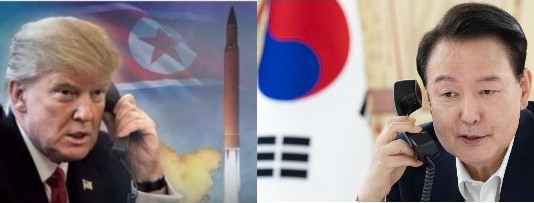U.S. President-elect Donald Trump’s new foreign policy team surprisingly aligns with South Korean President Yoon Suk Yeol’s administration in their shared commitment to the “peace through strength” strategy.
However, differences in primary targets — China for the U.S. and North Korea for South Korea — could hinder deeper policy alignment between the two allies.
Upon announcing the top security picks for his second term, with Mike Waltz as national security advisor, Pete Hegseth as secretary of defense and Marco Rubio as secretary of state, Trump described them to be “champions of America’s pursuit of peace through strength” — a slogan famously championed by Ronald Reagan — and underscored his “America First” policy.
The Yoon administration, too, adopted this approach after taking office, sharing the belief that maintaining military dominance is essential for countering revisionist forces that threaten the status quo.

Despite their shared philosophy, South Korea and the United States diverge in their primary targets for applying this “peace through strength” approach.
Trump’s team aims to counter China’s influence through a robust military posture, while South Korea’s focus is on strengthening so-called extended deterrence against North Korea.
Although efforts to contain China and North Korea are somewhat interconnected, experts caution that these differing focal points could create friction between the allies. Actions like joint military exercises and the deployment of strategic assets to counter North Korea’s nuclear threat are sometimes interpreted as anti-China maneuvers, which may complicate Seoul’s efforts to improve relations with Beijing.
“Trump’s foreign policy team emphasizes overwhelming strength toward China, while the Yoon administration targets North Korea,” said Kim Jae-chun, a professor of International Relations at the Graduate School of International Studies (GSIS) at Sogang University. “It’s important to be aware of this fundamental difference.” He added that Trump’s lower emphasis on shared values — like freedom and democracy — marks a shift from the Biden administration, which worked closely with Yoon on these issues.
Still, some observers believe Trump’s second-term “peace through strength” approach could extend beyond China to address North Korea as well.
Waltz, Trump’s pick for National Security Advisor, made clear before the second North Korea-U.S. summit in Hanoi in February 2019 that he expected “something very concrete” from North Korea, including “a full accounting of their program.” This focus on verification reflects a stance that Trump’s team will demand tangible changes before making concessions to Pyongyang.
Rubio, whose background as the son of Cuban immigrants has shaped his views, has been a vocal critic of North Korea’s nuclear program and human rights record. He has referred to North Korean leader Kim Jong-un as a “lunatic” with “over two-dozen nuclear warheads” and has expressed skepticism about North Korea’s willingness to denuclearize.
![U.S. President-elect Donald Trump gestures during a meeting with House Republicans at the Hyatt Regency hotel in Washington D.C. on Wednesday. [YONHAP]](https://koreajoongangdaily.joins.com/data/photo/2024/11/15/3711eba6-7364-4597-bcb4-87317db36d90.jpg)
Analysts believe these figures may act as a safeguard within Trump’s administration, ensuring that negotiations with North Korea do not lead to concessions without real progress. Additionally, some argue that Trump’s transactional approach to alliances could be leveraged to strengthen extended deterrence in the region.
“While each part of America’s nuclear umbrella carries a cost, South Korea could use this to institutionalize extended deterrence, including the consistent deployment of strategic assets, by securing reciprocated benefits even if it means covering some costs,” said Park Won-gon, a professor of North Korean studies at Ewha Womans University.
Another common thread in Trump’s foreign policy team is Waltz and Hegseth’s military background, particularly their Middle East experience, symbolizing U.S. interventionism of the 2000s.
The new national security advisor and secretary of defense nominees served in the Middle East but have since pivoted to the isolationist “Trumpism” approach, which aims to direct American power toward countering China, the U.S.’s primary rival, rather than global policing. The three appointees — Waltz, Rubio and Hegseth — are united in their strong anti-China stance, with Rubio himself having been sanctioned by Beijing twice in 2020.
![South Korean President Yoon Suk Yeol convenes a meeting with senior government officials and presidential aides at the presidential office in Yongsan District, central Seoul, on Sunday to discuss the economic and security implications of a second Trump administration. [JOINT PRESS CORPS]](https://koreajoongangdaily.joins.com/data/photo/2024/11/15/2d6b3cb9-6b8c-42b6-97a0-7d28fd7a9468.jpg)
In South Korea, Yoon’s foreign policy team similarly features seasoned military leaders, with figures like National Security Adviser Shin Won-sik and Defense Minister Kim Yong-hyun, both known for their strategic expertise and extensive field experience. Despite concerns raised in August about South Korea’s new security team’s ability to navigate the incoming U.S. administration, Trump’s decision to appoint veterans may facilitate convergence on some aspects of South Korea-U.S. relations.
BY PARK HYUN-JU [seo.jieun1@joongang.co.kr]





